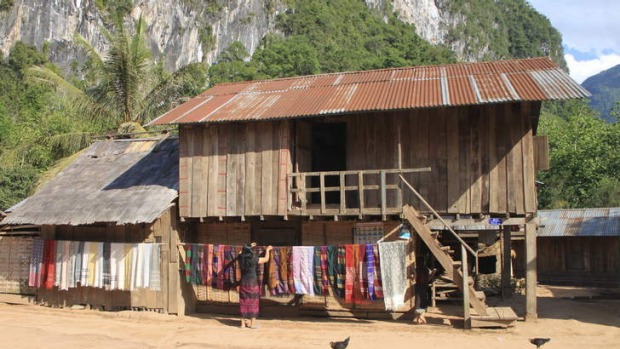
Mr Jing has that look in his eyes again. He's prowling around the table, his face lit bright by the fluorescent globe above, his smile mischievous, the bottle of home-brewed rice whiskey poised in his hand.
Here it comes again.
He walks over in my direction, stops, grins and begins to pour out another shot of the vicious spirit. "Yo!" he yells - "cheers", in Lao - clinking shot glasses with me and knocking back his drink. I'm forced to do the same, closing my eyes and bringing the dirty glass to my lips.
You can feel it draining down your throat, the burn of homemade whiskey as it makes its way towards your stomach. Breathe out and the fumes scorch your nasal passages, burning again as they make their escape.
Mr Jing just laughs, and goes back to prowling.
It would be rude not to accept this gift of Mr Jing's "lao-Lao" whiskey. He is, after all, the head of this village, the elected chief, and he's invited us into his home to eat at his table and enjoy his company.
He doesn't speak a word of English and we don't speak a word of Lao, but in this case it doesn't seem to matter. We speak the international language of home-distilled rice whiskey and incoming hangovers.
Mr Jing's village is called Ban Sopjam and it's a tiny little place, population about 200, a few wooden homes nestled between steep limestone cliffs in northern Laos. A river trundles idly by about 100 metres away; the cliffs provide sweet succour from the sun in the long afternoons.
This is a rarely visited section of a rarely visited country. Two hours downriver is the town of Nong Khiaw, the nearest place with anything resembling tourist infrastructure. There's a newly cut dirt road leading out of Ban Sopjam, but it would take the good part of a day to negotiate it in the hope of getting anywhere.
If you want to come in, or get out, you do it by boat.
That's what our group did, arriving in the mid-afternoon on the sandy riverbank, where we were met by Mr Jing and led up a narrow path through the jungle, past chicken coops and piles of cut firewood to the centre of the village. That's a dirt clearing, where a few young faces waited to see what the commotion was about.
There are no hotels in Ban Sopjam - not even any beds. Tonight my accommodation is in one of the villager's houses. I'll be bedding down the same way they do, on a thin mattress on the wooden floor, sharing space with the family, listening to chickens clucking below, dying for a breath of wind in the hot, still night.
I'll live the way the villagers live, and that's the whole idea. This is immersive tourism, putting yourself in someone else's shoes. Even if those shoes are plastic flip-flops that are about to fall apart.
After all, what's travel if it's not to immerse yourself? It's a cultural trade, an experience as mouth-gaping for me as it is for the little kids who've started following us as we take a short tour of the village.
There's no electricity here, no running water. A generator is used to power the machine that strips husks off the locally grown rice; small turbines have been set up in the river to power the village's few electric light bulbs.
After walking the single dirt street we head down to the river to bathe. With no running water, this is the local shower. We strip down to shorts and sarongs and wade in, and pretty soon we're joined by about 12 screaming, laughing local boys, who all want to be tossed in the air to practise their somersaults.
There's not a lot to do after that, just sit around in the village, try to avoid that burning sun, wait for dinner time to arrive. That's when we head over to Mr Jing's house, settle in at the small wooden tables as a feast of pork, chicken and rice is laid out, and the village hierarchy parades in to thank us for our patronage of their quiet part of the world.
And then, there's the lao-Lao. It's produced locally, same as everything else at this table - and this table. It's stored in old Beerlao bottles, and brought out on special occasions (say, the sun setting; or rising).
The idea is that we'll all drink a shot with Mr Jing, then we'll drink a shot with his No.2 in charge, and then we'll drink a shot with his No.3 in charge. But then things will escalate and Mr Jing will just pour out shots for whomever he feels looks thirsty.
I must look thirsty.
The writer travelled as a guest of World Expeditions.